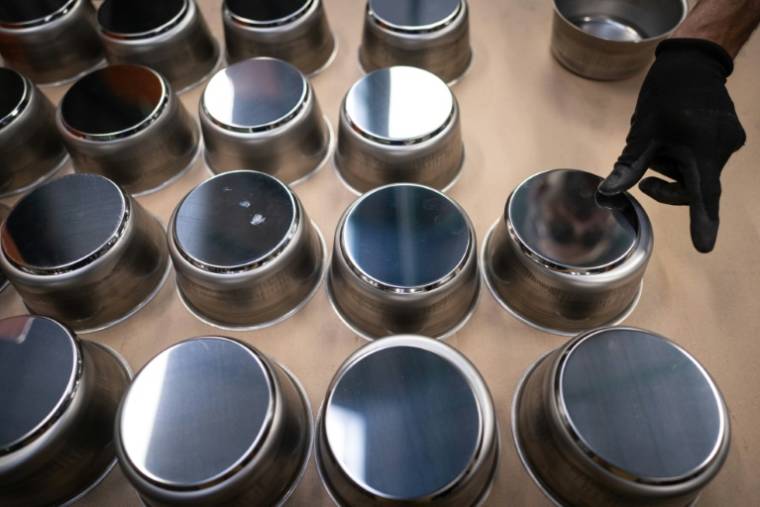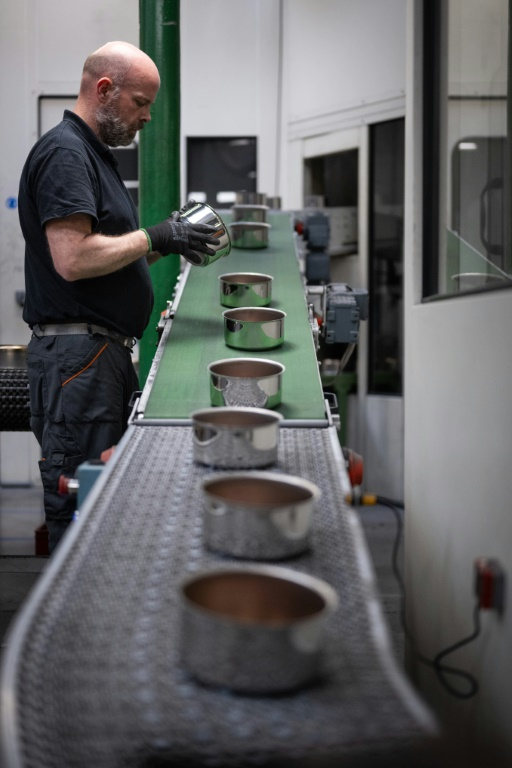An employee cleans a stainless steel pan in the Cristel factory in Fesches-le-Chatel, in Doubs, on May 23, 2024 (AFP / SEBASTIEN BOZON)
It almost succumbed to the offensive of the Teflon pan at the end of the 20th century, but the stainless steel pan has its revenge with the controversy surrounding the “eternal pollutants” (PFAS) present in non-stick coatings.
In Fesches-le-Châtel, in Doubs, the Cristel factory and its high-end pans sold as far away as Japan are on the rise: the French number one in stainless steel kitchen equipment has seen “demand explode “since the adoption in April in the National Assembly of a law restricting the use of PFAS due to health and environmental risks, confides its deputy general director Damien Dodane.
The bill must be examined from Thursday in the Senate. It plans to ban, from January 1, 2026, the manufacture, import and sale of any cosmetic product, wax (for skis) or clothing containing per- and polyfluoroalkyl substances (PFAS), except for safety protections.

An employee places the bottom of a saucepan before it is permanently fixed, on May 23, 2024 in the factory of the manufacturer Cristel in Fesches-le-Chatel, in Doubs (AFP / SEBASTIEN BOZON)
Following an intense campaign by the Seb group, owner of the famous Téfal frying pans, MPs also decided not to ban non-stick coatings in cookware.
But the debate has caused “real concern in the culinary market,” notes Damien Dodane, whose company sells both stainless steel and non-stick. If the two materials were until recently equally in sales, stainless steel has represented 70% of Cristel’s turnover for two months.
– The helmets of the furry –
On a blue conveyor belt, the utensils pass by, waiting for a worker to weld “the ears”, the small side handles on which the removable handle, Cristel’s signature, will be attached.
The company is almost two hundred years old if we consider it as the heir to the Japy company, which produced its first saucepan in 1826. Even before the controversy over PFAS, it benefited from the confinement linked to Covid-19, despite the price of its high-end products, sold between 90 and 160 euros.

An employee checks a saucepan on May 23, 2024 in the factory of the manufacturer Cristel in Fesches-le-Chatel, in Doubs (AFP / SEBASTIEN BOZON)
“People were worried, during confinement, about the equipment they had for cooking,” observes Mr. Dodane. The company had to hire 24 employees (there are currently 105) and saw its turnover almost double, to 20 million euros, compared to 12 million in 2019.
Cristel now exports a quarter of its production to 40 countries (including 7% to Japan alone) and is opening stores and subsidiaries from the United States to Indonesia. Data that makes its president Bernadette Dodane dream in retrospect, because the bet was not won in advance.
It was in 1983 that the adventure began. A group of workers take over the bankrupt Japy factory, which was one of the largest French companies of the Second Empire before supplying the army with helmets during the Great War.
But the cooperative production company (Scop) does not take off and an accountant, Bernadette Dodane, is called to the rescue to provide her knowledge of management and find a buyer. It submits a report to the public authorities on the viability of the factory, which it considers to be zero. “There was no future,” she recalls. “There had been three judicial bankruptcies in eight years.”
– From the stove to the dining room –
The only chance to get out of it: move upmarket, “while all the pans looked the same 40 years ago”. She calls… on her husband, Paul Dodane. Draftsman, designer technician at Peugeot, he has the idea that changes the game: the removable handle, which allows the saucepan to move elegantly from the stove to the dining room.

Bernadette and Paul Dodane pose on May 23, 2024 in the factory of the manufacturer Cristel in Fesches-le-Chatel, in Doubs (AFP / SEBASTIEN BOZON)
After the success of a prototype in a large trade fair, the employees of the company in danger asked the couple to take over management. In 1987, the Dodanes accepted, mortgaging their house up to 30% to save Cristel.
“You can cook everything in stainless steel. It just requires education,” assures their son Damien Dodane today. Each year, Cristel provides 200 culinary demonstrations at its resellers. “It’s our way of saying that the only alternative to eternal pollutants is stainless steel.”
As for its own products containing polytetrafluoroethylene (PTFE) release agents, Cristel has created a retreading activity: around a third of the equipment is returned to the factory, where a production line allows the coating to be redone. Cost to the customer? 30% of the purchase price. And a product guaranteed for life.
